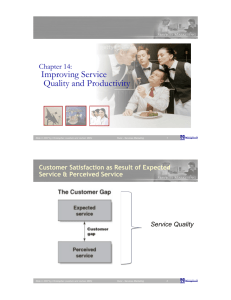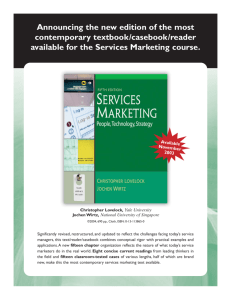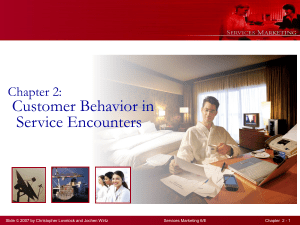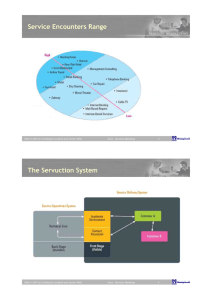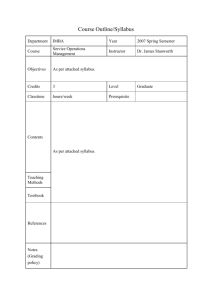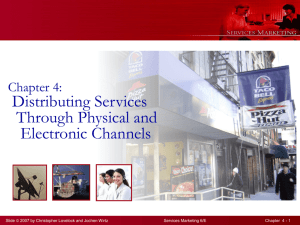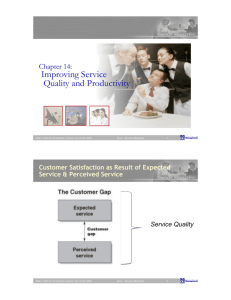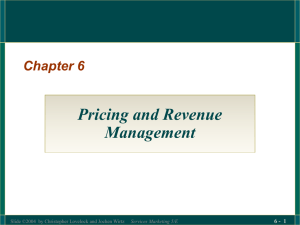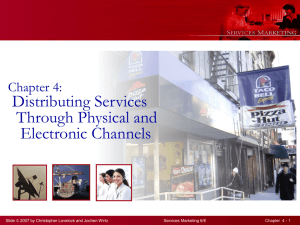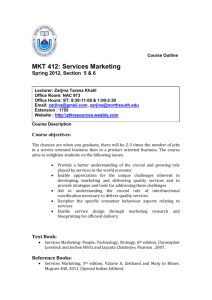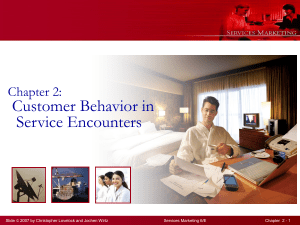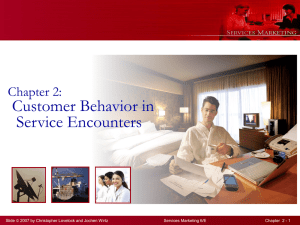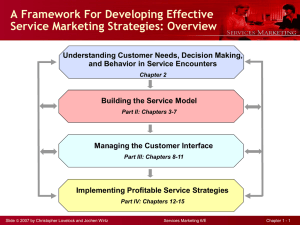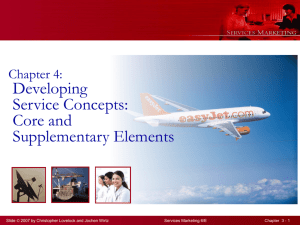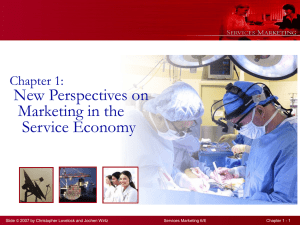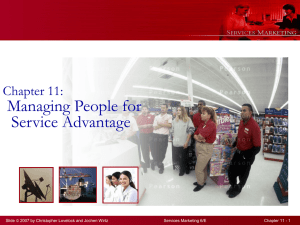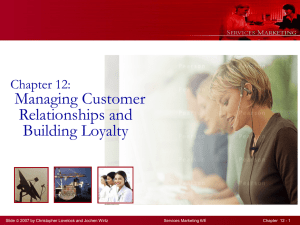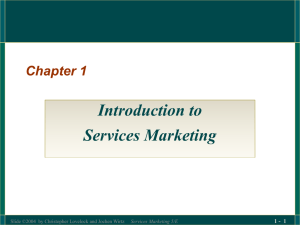Service Encounter Stage
advertisement
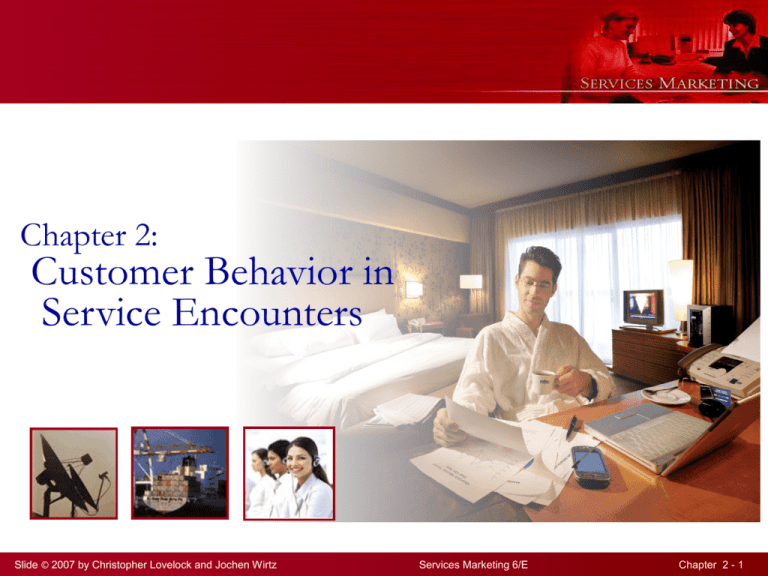
Chapter 2: Customer Behavior in Service Encounters Slide © 2007 by Christopher Lovelock and Jochen Wirtz Services Marketing 6/E Chapter 2 - 1 Overview Of Chapter 2 How Differences among Services Affect Customer Behavior Customer Decision Making: The Three Stage Model of Service Consumption Prepurchase Stage Service Encounter Stage Post-Encounter Stage Slide © 2007 by Christopher Lovelock and Jochen Wirtz Services Marketing 6/E Chapter 2 - 2 A Framework for Developing Effective Service Marketing Strategies Understanding Customer Needs, Decision Making, and Behavior in Service Encounters Chapter 2 Building the Service Model Part II: Chapters 3-7 Managing the Customer Interface Part III: Chapters 8-11 Implementing Profitable Service Strategies Part IV: Chapters 12-15 Slide © 2007 by Christopher Lovelock and Jochen Wirtz Services Marketing 6/E Chapter 2 - 3 A Framework for Developing Effective Service Marketing Strategies Two Key Themes in Part I of the Services Marketing Strategy Framework: Differences among Services Affect Customer Behavior Three-Stage Model of Service Consumption Prepurchase Stage: Search, evaluation of alternatives, decision Service Encounter Stage: Role in high-contact vs. low-contact delivery Post-Encounter Stage: Evaluation against expectations, future intentions Slide © 2007 by Christopher Lovelock and Jochen Wirtz Services Marketing 6/E Chapter 2 - 4 How Differences among Services Affect Customer Behavior Slide © 2007 by Christopher Lovelock and Jochen Wirtz Services Marketing 6/E Chapter 2 - 5 Differences among Services Affect Customer Behavior Consumers are rarely involved in the manufacture of goods but often participate in service creation and delivery Challenge for service marketers is to understand how customers interact with service operations Based on differences in nature of service act (tangible/intangible) and who or what is direct recipient of service (people/possessions), there are four categories of services: People processing Possession processing Mental stimulus processing Information processing Slide © 2007 by Christopher Lovelock and Jochen Wirtz Services Marketing 6/E Chapter 2 - 6 Four Categories Of Services (Fig 2.1) Who or What Is the Direct Recipient of the Service? Nature of the Service Act Tangible Actions Intangible Actions People Possessions People processing Possession processing (services directed at people’s bodies): (services directed at physical possessions): Barbers Health care Mental stimulus processing Slide © 2007 by Christopher Lovelock and Jochen Wirtz Disposal/recycling Information processing (services directed at people’s minds): Refueling Education Advertising/PR Services Marketing 6/E (services directed at intangible assets): Accounting Banking Chapter 2 - 7 Customer Decision Making: Three-Stage Model of Service Consumption Slide © 2007 by Christopher Lovelock and Jochen Wirtz Services Marketing 6/E Chapter 2 - 8 The Purchase Process for Services Prepurchase Stage Service Encounter Stage Post-Encounter Stage Slide © 2007 by Christopher Lovelock and Jochen Wirtz Services Marketing 6/E Chapter 2 - 9 Prepurchase Stage Slide © 2007 by Christopher Lovelock and Jochen Wirtz Services Marketing 6/E Chapter 2 - 10 Prepurchase Stage: Overview Prepurchase Stage Customers seek solutions to aroused needs Evaluating a service may be difficult Uncertainty about outcomes increases perceived risk Service Encounter Stage What risk reduction strategies can service suppliers develop? Understanding customers’ service expectations Post-Encounter Stage Components of customer expectations Making a service purchase decision Slide © 2007 by Christopher Lovelock and Jochen Wirtz Services Marketing 6/E Chapter 2 - 11 Customers Seek Solutions to Aroused Needs People buy goods and services to meet specific needs/wants External sources may stimulate the awareness of a need Companies may seek opportunities by monitoring consumer attitudes and behavior Figure 2.4 Prudential Financial’s advertising stimulates thinking about retirement needs Courtesy of Masterfile Corporation Slide © 2007 by Christopher Lovelock and Jochen Wirtz Services Marketing 6/E Chapter 2 - 12 Evaluating a Service May Be Difficult Search attributes help customers evaluate a product before purchase Style, color, texture, taste, sound Experience attributes cannot be evaluated before purchase—must “experience” product to know it Vacations, sporting events, medical procedures Credence attributes are product characteristics that customers find impossible to evaluate confidently even after purchase and consumption Quality of repair and maintenance work Slide © 2007 by Christopher Lovelock and Jochen Wirtz Services Marketing 6/E Chapter 2 - 13 Perceived Risks in Purchasing and Using Services Functional—unsatisfactory performance outcomes Financial—monetary loss, unexpected extra costs Temporal—wasted time, delays leading to problems Physical—personal injury, damage to possessions Psychological—fears and negative emotions Social—how others may think and react Sensory—unwanted impact on any of five senses Slide © 2007 by Christopher Lovelock and Jochen Wirtz Services Marketing 6/E Chapter 2 - 14 How Might Consumers Handle Perceived Risk? Seeking information from respected personal sources Relying on a firm that has a good reputation Looking for guarantees and warranties Visiting service facilities or trying aspects of service before purchasing Asking knowledgeable employees about competing services Examining tangible cues or other physical evidence Using the Internet to compare service offerings and search for independent reviews and ratings Slide © 2007 by Christopher Lovelock and Jochen Wirtz Services Marketing 6/E Chapter 2 - 15 Strategic Responses to Managing Customer Perceptions of Risk Offer performance warranties, guarantees to protect against fears of monetary loss For products where customers worry about performance, sensory risks: Offer previews, free trials (provides experience) Advertising (helps to visualize) For products where customers perceive physical or psychological risks: Institute visible safety procedures Deliver automated messages about anticipated problems Websites offering FAQs and more detailed background Train staff members to be respectful and empathetic Slide © 2007 by Christopher Lovelock and Jochen Wirtz Services Marketing 6/E Chapter 2 - 16 Service Encounter Stage Slide © 2007 by Christopher Lovelock and Jochen Wirtz Services Marketing 6/E Chapter 2 - 17 Service Encounter Stage: Overview Prepurchase Stage Service encounters range from highto low-contact Service marketing systems: highcontact and low-contact Service Encounter Stage Implications for customer participation in service creation and delivery Post-Encounter Stage Slide © 2007 by Christopher Lovelock and Jochen Wirtz Services Marketing 6/E Chapter 2 - 18 Service Encounters Range from High-Contact to Low-Contact (Fig 2.9) Figure 2.9 Levels of Customer Contact with Service Organizations Slide © 2007 by Christopher Lovelock and Jochen Wirtz Services Marketing 6/E Chapter 2 - 19 Distinctions between High-Contact and Low-Contact Services High-Contact Services Customers visit service facility and remain throughout service delivery Active contact between customers and service personnel Includes most people-processing services Low-Contact Services Little or no physical contact with service personnel Contact usually at arm’s length through electronic or physical distribution channels New technologies (e.g. the Web) help reduce contact levels Medium-Contact Services Lie in between These Two Slide © 2007 by Christopher Lovelock and Jochen Wirtz Services Marketing 6/E Chapter 2 - 20 Implications of Customer Participation in Service Delivery Greater need for information/training to help customers to perform well, get desired results Customers should be given a realistic service preview in advance of service delivery, so they have a clear picture of their expected role Slide © 2007 by Christopher Lovelock and Jochen Wirtz Figure 2.13: Tourists Appreciate Easy-toUnderstand Instructions When Traveling Services Marketing 6/E Chapter 2 - 21 Post-Encounter Stage Slide © 2007 by Christopher Lovelock and Jochen Wirtz Services Marketing 6/E Chapter 2 - 22 Post-Encounter Stage: Overview Prepurchase Stage Service Encounter Stage Evaluation of service performance Future intentions Post-Encounter Stage Slide © 2007 by Christopher Lovelock and Jochen Wirtz Services Marketing 6/E Chapter 2 - 23 Customer Satisfaction Is Central to the Marketing Concept Satisfaction defined as attitude-like judgment following a service purchase or series of service interactions Customers have expectations prior to consumption, observe service performance, compare it to expectations Satisfaction judgments are based on this comparison Positive disconfirmation if better than expected Confirmation if same as expected Negative disconfirmation if worse than expected Satisfaction reflects perceived service quality, price/quality tradeoffs, personal and situational factors Research shows links between customer satisfaction and a firm’s financial performance Slide © 2007 by Christopher Lovelock and Jochen Wirtz Services Marketing 6/E Chapter 2 - 24 Customer Delight: Going Beyond Satisfaction Research shows that delight is a function of three components: Unexpectedly high levels of performance Arousal (e.g., surprise, excitement) Positive affect (e.g., pleasure, joy, or happiness) Is it possible for customers to be delighted by very mundane services? Strategic links exist between customer satisfaction and corporate performance. Getting feedback during service delivery help to boost customer loyalty Progressive Insurance seeks to delight customers through exceptional customer service (Best Practice in Action 2.1) Slide © 2007 by Christopher Lovelock and Jochen Wirtz Services Marketing 6/E Chapter 2 - 25 Summary of Chapter 2: Customer Behavior in Service Encounters (1) Four broad categories of services People processing, possession processing, mental stimulus processing, information processing Based on differences in nature of service act (tangible or intangible), and who or what is direct recipient of service (people or possessions) Each poses distinctive service management challenges Three-Stage Model of service consumption helps us to understand and better manage customer behavior Slide © 2007 by Christopher Lovelock and Jochen Wirtz Services Marketing 6/E Chapter 2 - 26 Summary of Chapter 2: Customer Behavior in Service Encounters (2) Prepurchase stage Customers seek solutions to aroused needs Evaluation alternatives are more difficult when a service involves experience and credence attributes Customers face a variety of perceived risks in selecting, purchasing and using services Steps taken to reduce customers’ risk perceptions, include: (1) guarantees and warranties, (2) previews of service and visits to service facilities, (3) employee training, (4) instituting visible safety procedures, (5) easy access to information, and (6) advance notice of problems or delays Customer expectations of service range from “desired” to “adequate” with a zone of tolerance in between; if actual service is perceived as less than adequate, customers will be dissatisfied Slide © 2007 by Christopher Lovelock and Jochen Wirtz Services Marketing 6/E Chapter 2 - 27 Summary of Chapter 2: Customer Behavior in Service Encounters (3) Service encounter stage Service encounters range from high contact to low contact Servuction system differs by level of contact: ― High-contact services: Most parts of operations, service delivery, and marketing systems are exposed to customers ― Low-contact services: Some parts of systems are invisible to customers Role and script theories help us understand and manage customer behavior during encounters Theatrical view of service delivery offers insights for design, stagemanaging performances, and relationships with customer “audience” Post-encounter stage In evaluating service performance, customers can have expectations positively disconfirmed, confirmed, or negatively disconfirmed Unexpectedly high levels of performance, arousal and positive affect are likely to lead to delight Slide © 2007 by Christopher Lovelock and Jochen Wirtz Services Marketing 6/E Chapter 2 - 28
